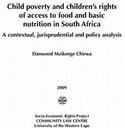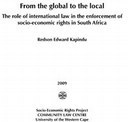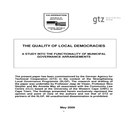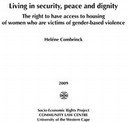Prof Ann Skelton and Dr Charmain Badenhorst conducted research on the criminal capacity of children in the South African child justice system. This research is informed by international developments at a United Nations level, together with developments in other countries both on the African continent and elsewhere. The purpose of this research is to add to the debate on the review of the criminal capacity provisions in the Child Justice Act of South Africa, which should take place no later than 2015.
The first issue of 2011 features Realising the rights of older persons in South Africa and an appraisal of General Recommendation 27 of the CEDAW Committee on protecting the rights of older women.
The issue includes articles that provide an overview of the protection and enforcement of socio-economic rights in Africa today.
On 15 September 2010 civil society organisations and human rights institutions participated in a seminar to discuss South Africa’s 2010 Draft Report on the status of its progress towards achieving the United Nations (UN) Millennium Development Goals (MDGs). The seminar took place against the backdrop of the MDG Review Summit that will take place at the United Nations in New York from 20-22 September 2010 as well as the UN’s annual treaty signing event also taking place from 21 to 23 and 27 to 28 September 2010 in New York.
The issue includes articles on adolescents' sexual health rights, regulating private power in health, protection of socio-economic rights by the African Commission. It also contains developments on parliament and the MDGs as well as HIV and AIDS, among others.
A compilation of chapters on local government in Zimbabwe, addressing matters such as institutions, elections, finance, traditional leadership, powers and supervision.
Research Report number 7. This research report is written by Prof Danwood Mzikenge Chirwa. Millions of children in South Africa bear the yoke of extreme forms of poverty and its associated evils, such as malnourishment, stunted growth, nutritional-deficiency diseases and illiteracy. The depreciation of the South African rand towards the end of 2008 and the current global financial crisis have only served to entrench child poverty by pushing poor households into deeper levels of deprivation and relegating those who were previously financially stable to the status of the poor.
Ward committees are posited as the focal point for community participation in municipalities. There are many questions, however, about how effective they are; whether they are useful conduits for community involvement in governance; whether, as ‘created spaces’ for public participation, they are inherently capable of playing that role; and whether they create opportunities for real power-sharing between municipalities and citizens. This research report offers contains in-depth qualitative studies of six ward committees. It provides insight into how ward committees are functioning and the key reasons behind the some of the problems many appear to have. It also provides valuable lessons for strengthening the role of ward committees.
This publication is intended to provide the reader with a simple overview of the contents of the Child Justice Act 75 of 2008 (the Act). It attempts to reduce the ‘legalise’ of the Act; remove constant cross-references to other sections; and bring themes together in a logical and user-friendly manner.
Socio-Economic Rights Project Research Series 6, 2009. This research paper by Redson Edward Kapindu explores the vital role of international human rights law and jurisprudence, including the UN and African human rights systems and policy frameworks, in advancing socio-economic rights at the domestic level in South Africa. The paper starts by providing a general overview of the international (including African regional) human rights system and their relevance. The paper proceeds to explore the question of the applicability of international human rights law under the South African Constitution. In this regard, the paper provides an incisive discussion of the domestic application of international socio-economic rights obligations in South Africa, paying special regard to the significance of General Comment 9 of the CESCR and the issue of minimum core obligations. The paper concludes with an exposition of some of the challenges in the application of international law in advancing socio-economic rights in South Africa and provides some recommendations.
Good governance in municipalities is essential for service delivery. Without clear reporting lines, functional accountability mechanisms and a clear separation of politics from administration, municipalities do not stand a chance at delivering on their mandate to communities. This research paper examines the practice of governance in municipalities. More than 30 interviews were conducted to establish how councillors relate to officials, how political parties relate to municipalities and how municipal office-bearers relate to one another. The picture it paints is bleak.
The brochure contains information on the following: What does the New Children's Act do? How does the Children's Act protect our children? How are children protected against HIV, STD'S and unplanned pregnancies? Who must report abuse? What are our parental responsibilities and rights? Who has parental responsibilities and rights? What about child-headed households? What about our cultural and religious practices?
Socio-Economic Rights Project Research Series 5, 2009. This research paper by Heléne Combrinck examines the nature and extent of state duties to promote the realisation of the right to have access to adequate housing of women who are victims of gender-based violence, with specific reference to domestic violence. The paper first sketches the background to domestic violence and housing in South Africa generally and explains the housing needs of women experiencing domestic violence as well as the link between domestic violence and forced evictions. It then examines constitutional obligations to promote access to housing, with reference to the Grootboom and subsequent judgments. The paper further sets out the legislative and policy framework supporting access to housing in South Africa and examines whether this framework currently makes adequate provision for women who are victims of domestic violence. Though the focus is on South Africa, the paper also looks at the standards and norms that have emerged in international human rights law, with specific reference to the rights to adequate housing, gender equality and freedom from violence. Finally, the paper proposes certain recommendations based on the conclusions reached.

























